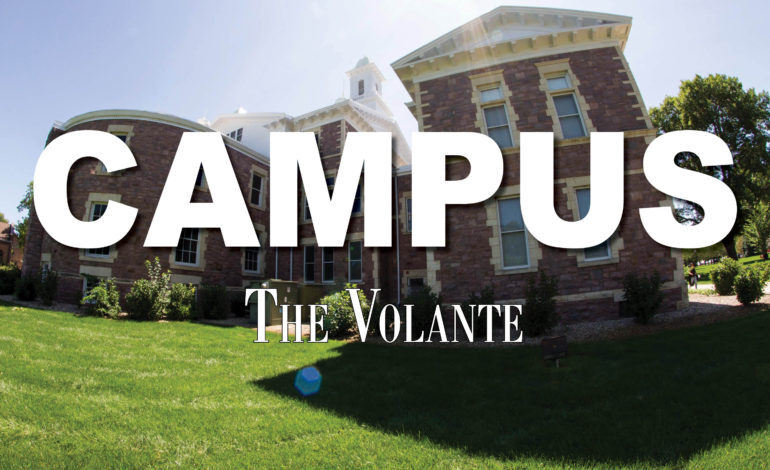
SGA cuts organization budgets due to lower enrollment projections
In the Student Government Association’s (SGA) annual budgeting process, many student organizations have seen cuts to their requests. This comes as a decrease in enrollment following the pandemic caused reductions in USD’s General Activities Fund (GAF), which, in addition to SGA spending, includes athletics, student media and maintenance. One organization impacted by the reduction in funds is Spectrum, an LGBTQ student organization on campus.
Logan Johnson, SGA’s Director of Finance, said the budgeting process involves seminars explaining the timeline and steps for organizations to remain eligible, followed by a week for the organizations to formulate budget requests for fiscal year 2022.
SGA’s budget committee then deliberates on potential cuts to budgets, eligibility for line items and drafting of final budget bills. Factors for funding amounts include testimony of organization leaders, past utilization rates, the number of students impacted and outside funding the organization has access to. Food and travel requests are considered the lowest-priority expenditures.
Johnson said SGA expects to be asked to make a payment back into the GAF fund, but has not yet received guidance on how much. Last year, SGA made a contribution of $100,000 back into the fund.
For this year’s budget, the SGA senate approved $81,024.50 for small organizations, $220,000 for large organizations and $15,000 for club sports. Large organizations are able to request over 3% of the total budget allocation.
This year, SGA received $161,000 in requests from over 45 small organizations, which required cuts of 50% across the board to fall within the SGA senate-approved budget. The average cut was 54.7%, with highs at 100% and lows at 0%. For large organizations, the requests totaled over $256,000, requiring a cut of 14.2% across the board. Club sports requested the amount allocated.
“The budget process can hardly be boiled down to just a percentage cut from the request,” Johnson said in an email interview with The Volante. “Some organizations request the maximum allotted for small organizations just to see what will happen.”
Tallon Everson, chair of SGA’s senate budget committee, said SGA prioritizes funding through line items, looking at funding for operations, entertainment and speakers, food, travel and marketing and advertising. SGA favors operational costs and cuts travel and foot costs first.
“We try to ensure that money is spent in a way that best benefits the students of the university, because our funding comes from the General Activity Fund, which is directly student funded,” Everson said.
If an organization needs funding for a specific cost later in the semester, Everson said the organization can use SGA’s special appropriations process.
“So there is a little bit of leeway, and we’d be happy to advise student organizations on how to work under a lower budget,” Everson said.
Spectrum saw its budget cut by 49%, slightly below the average cuts for student organiztions this year. Johnson said the cuts were made to portions of the budget dedicated to a trip open only to members.
“This was a clear instance where we had to prioritize activities that would benefit higher numbers of students,” Johnson said. “We prioritized cutting food and travel, and did everything we could to leave ample funding for their fall and spring drag show performers.”
Johnson said the organization’s requested budget would have been 14.4% of the total small organization allocations, which are split between over 45 organizations.
Spectrum advisor Judas Holmberg said the cuts will mean Spectrum will have to fundraise by charging admissions fees to events like the drag shows, which were able to be offered free to USD students this year. The cuts to Spectrum’s travel budget will mean the organization will also have to fundraise to travel to their annual national conference, which had been canceled last year due to the pandemic.
“It’s going to result in less of those organizations’ events being paid for completely out of their SGA budgets,” Holmberg said. “It’s gonna result in more like, in-the-moment out-of-pocket costs for students.”
While USD is planning for a more normal fall semester that will allow student organizations to hold more in-person events, Holmberg said the cuts to organization budgets will impact this.
“We’re going to be able to start putting on these events and activities and all of that stuff again, but whether or not organizations will have the funding to do that is the question,” Holmberg said. “It’s going to be a return to normal year with a little asterisk that’s like, normal, but do it with less money.”
Holmberg, who was a member of SGA for two years and chair of the finance committee for one year, said he understands cuts to the budget had to be made, but that he wished utilization rates were taken more into account in considering cuts.
“My issue was, yes, cutting everybody 50% is the fair, like everybody gets cut, way to go,” Holmberg said. “I’m very grateful for the work they have done and what we are getting, but the tactic would have been something different for myself, had I been a part of it.”
Johnson said SGA warned organizations funding would be tight, and encouraged organizations to utilize fundraising for shortfalls. Johnson also said since historically few organizations reach 100% utilization of allocated funds, the reduction in allocations might give SGA a better idea of real utilization, which will help with allocation going forward.
“It’s our goal to foster a healthy environment for our student organizations,” Johnson said. “COVID-19 is going to have lasting effects on the financial situation of our university, but at SGA we’re hoping to insulate organizations as much as possible.”


